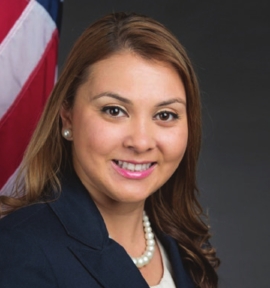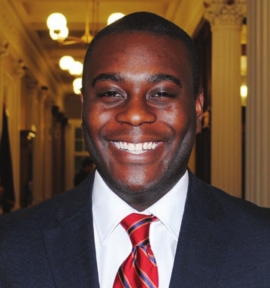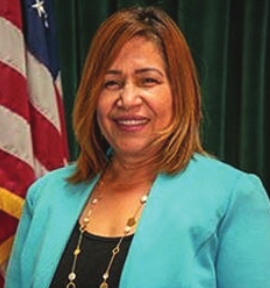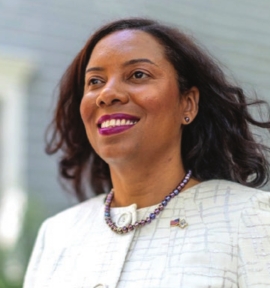
Sandra Cano

Gabe Amo

Ana Quezada

Sabina Matos
Many candidates of color vying for rep. seat
More than a dozen Democratic candidates have entered the special election race for the Rhode Island congressional seat vacated by Rep. David Cicilline. who announced his resignation June 1 to run the Rhode Island Foundation.
Out of at least 16 candidates running, more than half are persons of color, ranging from the lieutenant governor to a former public transit bus driver. Any of the 11 would be the first person of color to represent the state in Congress. Currently, no Republican candidates are running for the second congressional seat. The deadline to file with the state is June 30.
Harrison Tuttle, the president of the Black Lives Matter Rhode Island PAC, said while there have been many notable candidates of color in the past, this is the first time so many are running in the same race.
“It’s a really exciting moment in Rhode Island. It’s a historical moment,” he said. “Of course, there’s no guarantee that we will have a person of color elected, but I think specifically in the [1st] Congressional District and the demographics and politics in that district, there certainly is an amazing opportunity to elect someone that represents a diverse group of opinions and cultures.”
The district includes all of Bristol and Newport counties, along with a majority of the city of Providence.
As
of 2020, the district’s total population was 532,603, with about 66%
being white, 18.6% Hispanic or Latino, 7.3% Black and 3.5% Asian,
according to the U.S. Census Bureau.
The primary election is scheduled Sept. 5 and the general election Nov. 7.
Tuttle
said fundraising and getting to know constituents will be important in
the special election campaign, since some candidates might have more
name recognition than others.
“Realistically,
they just need a little bit under 20% of the voters in the primary. I
think we have plenty of candidates in this race that are qualified to do
the job,” Tuttle said. “I think it’s going to come down to messaging,
and I think it’s going to come down to how voters feel their messaging
is hitting with them.”
The Banner interviewed four of the 11 candidates of color competing for the open seat.
Sabina Matos
Sabina
Matos is the lieutenant governor of Rhode Island. She was first
appointed to the office in 2021 and then elected to a full four-year
term in 2022. Matos previously served on the Providence City Council
from 2011 to 2021 and worked for nonprofit organizations in Rhode
Island. Originally from the Dominican Republic, she immigrated to the
state in 1994.
“I was
thinking about what is the best way in which I can serve the people of
the state of Rhode Island,” Matos said. “I believe that going to
Washington, I’m able to continue advocating for the things that I care
about, things that I’ve been working on since I was in the local
government in Providence at the City Council, and now at the state
government.”
Matos
said her main issues are addressing the housing crisis, restoring
democratic values, strengthening gun control regulations and protecting
reproductive rights. She added that being the first woman and woman of
color to represent the district would be a “big honor and
responsibility.”
“When
you’re the first one of something, there’s a lot of expectations.
Expectation of how you’re going to perform. Expectation you put on
yourself like I put on myself. I know that if I do something that is
bad, unfortunately, my whole community is going to be paying the
consequences of all of those things,” she said.
Gabe Amo
A
native Rhode Islander, Gabe Amo is the son of Ghanaian and Liberian
immigrants. He previously worked in the White House Office of
Intergovernmental Affairs as a liaison to governors and state elected
officials under President Barack Obama and as deputy director and
special assistant to President Joe Biden. Amo also previously served as
an outreach advisor to Rhode Island Gov. Gina Raimondo.
“I
want to take the experience that I gained to be an effective member of
Congress for Rhode Islanders from day one and fight for working families
and their priorities,” Amo said.
He
said his main issues are protecting Medicare and Social Security,
expanding access to reproductive care, fighting climate change and
expanding gun control.
“Now
I want to use the experience and the energy and the frustration with
the status quo to not just offer thoughts and prayers to a community
when something bad happens, but to go fight vigorously and see what we
can do to get our Republican House members to see the light and ensure
that we make sure that no families have to continue experiencing great
loss,” he said.
Sandra Cano
Sandra
Cano has been a state senator since 2018 after serving as an at-large
city councilor and on the school board in Pawtucket.
She is originally from Medellín, Colombia and immigrated to Rhode Island in 2000 when she was 16.
“I
do love to help people,” Cano said. “Ever since I got elected into
local public office, I’ve been driven by residents, the district and the
people of Rhode Island to advocate for them and being the voice of
those that don’t have a voice. So it will be the honor of my life to
represent them in different levels of government.”
Cano’s
platform consists of fighting to protect Medicare, Social Security,
access to high-quality education and economic opportunities for all.
“I
believe that having been a mom and experiencing the struggles of many
families in the district, access to child care is and will continue to
be a priority and also making sure that we protect our environment,” she
said.
Ana Quezada
Ana
Quezada has been a state senator since 2017 and previously worked as a
social service coordinator at John Hope Settlement House and code
enforcement inspector for the city of Providence.
She was born in Santo Domingo, Dominican Republic and moved to New York City in 1982 before moving to Providence in 1990.
“The
most important thing is to represent my state in Washington,” Quezada
said. “I know through my years in the Senate, I have skills to be able
to do that and to be the strong voice for Rhode Island, to fight for
Rhode Island and bring the resources that we need for our community.”
Her
main issues are addressing the housing crisis, improving education,
increasing access for reproductive care and protecting Medicare and
Social Security. She said the state changed a lot after the pandemic,
with many people moving in from big cities like New York and Boston for a
slower pace of life.
“I
think after COVID, so many people changed their way of life, and they
look at our state like a possibility to grow their family, because they
can buy family houses, maybe near areas that are more natural. And that
was good for us,” she said.
The
other seven candidates of color in the race are state Rep. Marvin Abney
of Newport, who is African American; Mickeda Barnes, the former bus
driver, who is African American; Stephanie Beauté, a former candidate
for Rhode Island secretary of state who is Black; State Rep. Nathan Biah
of Providence, an immigrant from Liberia; Providence City Councilor
John Goncalves, who has Cape Verdean ancestry; Allen Waters, a Black
conservative who previously ran for the seat as a Republican; and Bella
Machado Noka, a Narragansett tribal elder.
The
five white candidates definitely in the race are former state official
Nicholas Autiello, state Rep. Stephen Casey of Woonsocket, former state
Rep. Aaron Regunberg, former Navy intelligence officer Walter Berbrick
and Jamestown businessman Don Carlson.